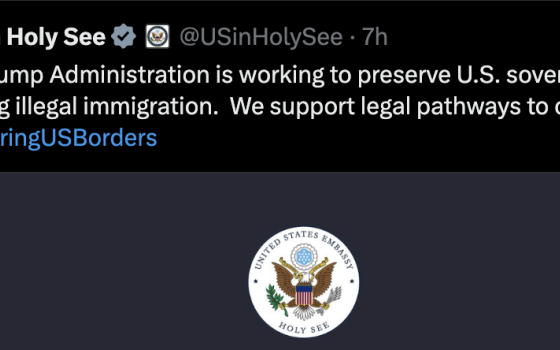
Pat Robertson, right, speaks with Republican presidential candidate Jeb Bush during a presidential candidate forum at Regent University in Virginia Beach, Va., Oct. 23, 2015. Robertson, who died June 8 at age 93, ran for the Republican nomination for president in 1988, coming in behind both George H.W. Bush and Bob Dole. (AP/Steve Helber)
The death of Pat Robertson on June 8 marks the end of an era. If the Scopes trial began the internal, cultural exile of most born-again Christians, the emergence of Robertson and Jerry Falwell in the last decades of the 20th century marked the reentry of conservative Christians into the mainstream culture. They both built empires, but Robertson's lasted and was always larger.
Before Robertson and Falwell, the public face of religion in America had been liberal Christianity: Civil rights leader, the Rev. Dr. Martin Luther King Jr., for example, and antiwar activist, the Rev. William Sloane Coffin. After the rise of evangelical Christians like Robertson, the public image of Christianity was conservative, especially in the arena of politics. It still is.
When I was researching my biography of Falwell published in 2012, Robertson seemed always to be over Falwell's shoulder. The two men had very different personal life stories. Falwell had been born into a poor family, while Robertson was the second son of a U.S. senator. Falwell attended a small Bible school in Missouri, but Robertson graduated magna cum laude at Washington and Lee University, and later went to Yale Law School. Robertson's conversion coincided with his flunking the bar exam, so he went into ministry. Falwell's empire lasted only about a decade, but Robertson started his first radio station in 1961 and grew it into the largest Christian network in the world. Falwell would always be at his best in the pulpit, but Robertson excelled in the conversational format of his "700 Club" television show.
The two men also had very different theological perspectives. Falwell had a charismatic personality but his theology was strictly fundamentalist. Robertson was charismatic in both senses of the word. These differences were sharpest when Falwell first started building his empire. When he launched a glossy magazine, The Fundamentalist Journal, in 1982, editor Nelson Keener made clear in the first issue that the journal would avoid charismatic Christians like Robertson and Oral Roberts. The theological differences were foundational: What counted as authority? For Falwell, it was the literal reading of the biblical text and for Robertson it was the promptings of the Holy Spirit, which he thought would always cohere with the biblical text.
Despite the different foundations upon which they built, the two men and the religious movements they led converged when they turned to politics. Both believed the sexual revolution and other forms of social liberalism had eaten away at the moral fiber of the country, and if the country wished to return to greatness, the restoration needed to start with morals. Both men took an uncritical stance toward American power, whether it be military power exercised abroad or economic power exercised at home. Both swallowed some historical foolishness about the founding of the United States and endowed the Constitution with quasi-divine authority. In different ways, they helped forge the alliance between conservative Christians and the modern Republican Party.
This was the opposite of what happened to Catholics. Our entry into politics brought forth the ideological divisions among our co-religionists. Democratic Catholics and Republican Catholics both accept the revelation of Jesus Christ, expressed in Scripture and tradition and received with an authoritative magisterium. We Roman Catholics all believe in the seven sacraments. We put different emphases on the relationship of grace and nature, but reject neither. It is when we get into politics that we begin to argue.
Robertson was strategic and cool, where Falwell was enthusiastic and impulsive, but their common vision of what ailed America — both men saw AIDS as God's retribution on gays for their lifestyle choices — allowed them to become more frenemies. Still, when Robertson decided to run for president in 1988, Falwell backed the mainstream George H.W. Bush over his fellow pastor. "I think Pat Robertson would make an excellent president," Falwell told the press. "I just think George Bush would make a better one." Falwell also liked to back a winner, and he thought, correctly, that Bush would snag the GOP nomination that year.
Advertisement
One of Falwell's last, most regrettable media appearances came on Robertson's "700 Club." It was a few days after the terrorist attacks of Sept. 11, 2001. In this instance, the two men agreed on the role of God's providence. "God continues to lift the curtain and allow the enemies of America to give us probably what we deserve," Falwell said. Robertson agreed.
The dystopian vision that Donald Trump would later make his hallmark is sourced, in part, in this prophetic Christian vision Pat Robertson and others articulated: God would punish those who transgressed his purposes for America. Robertson was part of a long chain of preachers, stretching back to Increase and Cotton Mather, right through to Bishop Joseph Strickland today for whom America is a promised land beset by liberalism, and so bigotry becomes a sign of Christian virtue.
The people I interviewed for my book on Falwell all described Robertson as a gentleman, someone who was kind and encouraging to his colleagues. He was undoubtedly intelligent. The sincerity of his faith is beyond doubt. Still, he played a part in the coarsening of religious faith at a time when the culture was only too susceptible to such a coarsening, and that fact continues to harm the Christian churches. I hope he makes it to heaven. I also wish he had not failed that bar exam so many years ago.






